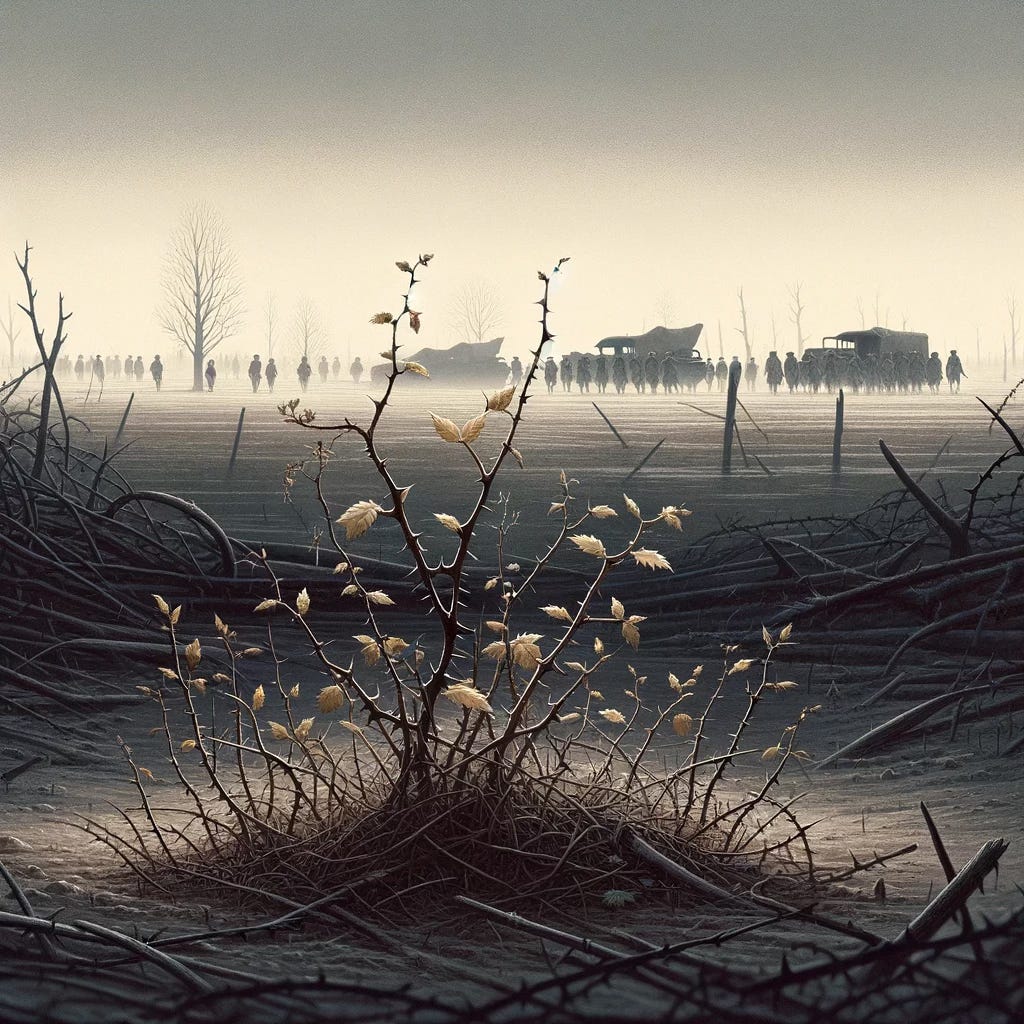#30 Can a War Be Justified? The Taoist Perspective
Tao Te Ching, Chapter 30
Welcome back to The Wisdom of Lao Tzu.
We are reading chapter 30 of Tao Te Ching this week, where we learn Lao Tzu’s thoughts on war or the use of force.
Is there a valid justification for engaging in conflict? What about the pursuit of national independence or defense? Can war be justified as a means to liberate and save?
What is the Taoist perspective on the legitimacy of war?
Let’s find out.
**30**
以道佐人主者,不以兵強天下,其事好還。
師之所處,荊棘生焉。
大軍之後,必有凶年。
善者果而已,不敢以取強。
果而勿矜,果而勿伐,果而勿驕,果而不得已,果而勿強。
物壯則老,是謂不道,不道早已。
Border-crossing: English translations
#1 Lin Yutang’s version
He who by Tao purposes to help the ruler of men
Will oppose all conquest by force of arms.
For such things are wont to rebound.
Where armies are, thorns and brambles grow.
The raising of a great host
Is followed by a year of dearth.
Therefore a good general effects his purpose and stops.
He dare not rely upon the strength of arms;
Effects his purpose and does not glory in it;
Effects his purpose and does not boast of it;
Effects his purpose and does not take pride in it;
Effects his purpose as a regrettable necessity;
Effects his purpose but does not love violence.
(For) things age after reaching their prime.
That (violence) would be against the Tao.
And he who is agains the Tao perishes young.
#2 Edmund Ryden’s version
One who helps the lord of men according to the Way,
Does not use arms to subdue the world since such actions
easily rebound.
Where armies are encamped, thorny bushes grow.
After great battles there will inevitably be lean years.*
The good know when enough is enough and do not go on to win subjection.
When enough is done he does not boast of it;
When enough is done he does not brag about it;
When enough is done he does not take pride in it.
Even that enough is done only as a last resort.
This is called
‘Doing enough and not going on to subdue.’
When things are mature then they turn old: this is called
‘Negating the Way’.
What negates the Way will soon be lost.1
#3 D. C. Lau’s version
One who assists the ruler of men by means of the way does not intimidate the empire by a show of arms.
This is something which is liable to rebound.
Where troops have encamped
There will brambles grow;
In the wake of a mighty army
Bad harvests follow without fail.
One who is good aims only at bringing his campaign to a conclusion and dare not thereby intimidate. Bring it to a conclusion but do not boast; bring it to a conclusion but do not brag; bring it to a conclusion but do not be arrogant; bring it to a conclusion but only when there is no choice; bring it to a conclusion but do not intimidate.
A creature in its prime doing harm to the old
Is known as going against the way.
That which goes against the way will come to an early end.2
Deeper dive
When it comes to war, Lao Tzu warns political leaders about its danger. He also suggests that political advisors recommend policies guided by the spirit of wu-wei, not meddle with ordinary people’s lives with war-mongering efforts.
First, Lao Tzu cautions that wars will bring vengeance and retributions. It does not matter if a country has a powerful army or not because revenge will always find its way to inflict upon innocent people.
Those who avidly support war as a policy do not have a deep understanding of its consequences, or worse, they have a hardened heart not to care, as Lao Tzu observed,
Where armies are, thorns and brambles grow.
The raising of a great host
Is followed by a year of dearth.
Judging from the aftermath of any war, all we see is the sufferings of ordinary people. And if we consider the repercussions of war, it is easy to verify the vicious cycle into which it plunges opposing sides.
From a world-historical point of view, wars, conflicts, and conquests take many forms beneath the superficial decoration of civilized code and conventions.
So, what is Lao Tzu’s bottom line on war as a practical policy?
Going to war should only be justified with the intention to end it, as he suggests for the general: “One who is good aims only at bringing his campaign to a conclusion and dare not thereby intimidate.”
Therefore, the general who knows military statecraft should only initiate wars to end chaos and calamities, nothing more.
Wang Bi’s comment (226-249 AD) on the statement — “Effects his purpose as a regrettable necessity; Effects his purpose but does not love violence”— shows that going to war is only a policy of necessity.
He said, “…one who uses force to hasten results and relieve disasters must do it reluctantly. When he has to use it again, he should aim to stop violence only and never leverage the winning outcome to show power.” 「言用兵雖趨功濟難,然時故不得已後用者,但當以除暴亂,不遂用果以為強也。」3
After ending instability and chaos, the general never harbors a sense of arrogance and complacency because the act of war is out of necessity.
Spiritual Taoism
Can we learn something new and valuable from this chapter about war or the use of force?
Before answering this question, we can all agree that war is fundamentally inhuman.
From a Taoist perspective, war essentially violates the principle of wu-wei. It imposes calamities, violence, and suffering on ordinary people. It reflects a cold-hearted and arbitrary decision to inflict human loss. And it reveals the act of killing one’s humanity.
The consequences of war are many. One of the most insidious effects is that ordinary people are forced to abandon their original and natural way of life.
How do we know a war is necessary? What is the legitimacy of the use of force?
As we already know, the answer lies in the intention to relieve calamities and end violence.
In our modern world, one of the toughest challenges for homeland security is terrorism. If a militant group or organization carries out a terrorist attack on innocent civilians, then a war to end the source of terrorism, once and for all, becomes necessary.
The reason is simple: terrorism is worse than the act of declaring a war. It is controlled by the fanatic intention of inflicting pain and suffering on absurd causes.
Therefore, we can borrow Lao Tzu’s reason for going to war to assess actions intending to uproot terrorist organizations and their potential to unleash violence and disasters.
However, it is critical to recognize the risk of overreach, which can lead to unnecessary suffering. This can foster feelings of hatred, antagonism, and the desire for revenge.
Thank you for reading.
I hope you are all safe and sound and enjoying the holiday break.
Merry Christmas!
Until next week,
Yuxuan
Daodejing, trans. Edmund Ryden. (Oxford: Oxford University Press, 2008), 63.
Tao Te Ching, trans. D. C. Lau. (London: Penguin Classics, 1963), 35.
Wang Bi et al., Four Kinds of Laotse 老子四種 (Taipei: National Taiwan University Press, 2016), 26.







